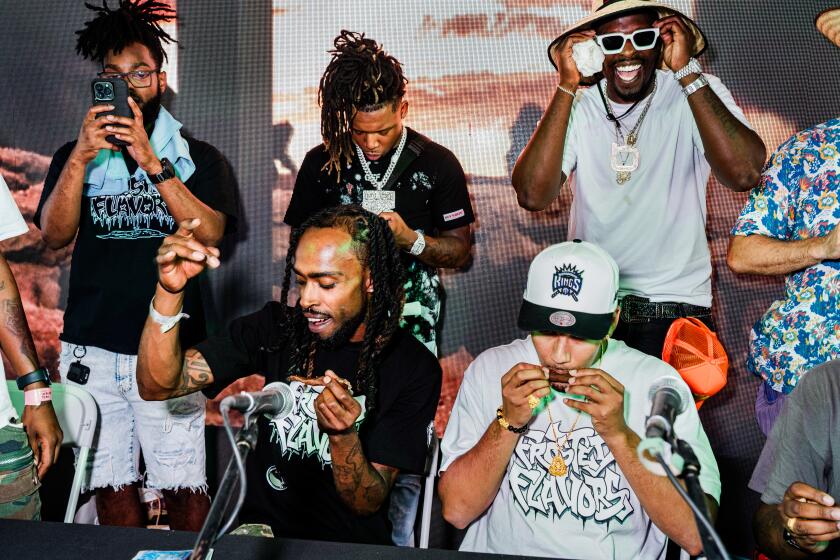The Ultimate Gamble
Clickety clack, clickety clack, clickety clack.
Close your eyes and you’d swear you were in the middle of that famous snake pit from “Raiders of the Lost Ark.” These aren’t rattlers, though; that sound is the incessant beat of money. In this case, high-denomination clay chips. Downtown Vegas or “Glitter Gulch” as they call it--a little grimier, a little tackier than the Strip and, to the professionals, a whole lot more authentic and inviting. Here at Binion’s Horseshoe, a hotel-casino for no-frills gamblers, 354 of the world’s most talented poker players are intensely focused on a singular mission: They are trying to take each other’s money. All of it.
This is Day One of the World Championship of Poker, a four-day marathon “freeze-out” that will end when just one gambler is left standing. The no-limit event (meaning a player can bet anything in front of him at any time) is the final in a series of card tournaments. The only game played is Texas Hold ‘Em, a popular twist on 7-card stud.
It’s not for the fainthearted. The entry fee is a crisp $10,000. The winner pockets $1 million in cash and a gold bracelet that signifies poker’s highest honor. It’s the finale to a monthlong World Series for action junkies in a town where net worth is often measured by the gleam of your gold watch or the number of $100 bills in your bankroll.
“These guys are mental athletes,” says Jack Binion, the amiable president of Binion’s Horseshoe, surveying a mushroom cloud of cigarette smoke and a sea of garish track suits and cowboy hats. “Poker players are just like everyone else. They want the recognition of their peers for being the very best.”
It’s been that way since the tournament was created by Benny Binion, a bootlegger who bought a place called the El Dorado in 1949 and converted it to the Horseshoe before promptly doing prison time for tax evasion. What began in 1970 with just 13 players voting on who was best has grown into an international event attracting punters from some 30 countries. The tournament is symptomatic of the growth of poker itself. With the advent of dozens of card clubs and American Indian reservation casinos that now dot the landscape, tournaments of various sizes are staged every week of the year.
Players are dealt two cards face down and then five more common cards are dealt face up; the first three are known as the “flop” and the fourth and fifth cards are dealt one at a time, forming “fourth street,” and finally “fifth street” or “the river.” Players make the best hand they can using only five cards.
And it’s not just the professionals who have come out for the event. Matt Damon, the 27-year-old star of “Good Will Hunting” and the upcoming poker movie “Rounders,” is hooked. Both he and his co-star, Edward Norton, have entered the tournament. (Rumor among the pros is there’s a bounty on Damon’s head for whoever knocks him out.)
The real pros, most of whom live here, are a highly intelligent, idiosyncratic and competitive bunch. The legendary gambler Amarillo “Slim” Preston (knocked out on Day One of the tournament) once described an opponent as “so mean he’d put a rattlesnake in your pocket and ask you for a match.”
Poker players have their own jargon, a kind of underbelly shorthand designed primarily to move things along. If you’re losing, you’re “stuck.” If you’re broke, you’re “tapped out” or “tap city” or even “tapioca.” Holding the best hand? You’ve got the “nuts” or the “rocks.” Chasing too many hands (or not folding when the percentages dictate doing so) and you are on “tilt.”
Doyle “Texas Dolly” Brunson, already a two-time winner of this event, is back to try to regain his championship form. T.J. Cloutier, a silver-haired, chalk-faced tournament specialist who learned to play the game while “fading the white line” (traversing the highway) in Texas, is signed up. So is Huck Seed, a 26-year-old Wunderkind who, at 24, was the youngest player to ever win the championship.
Over the next few days, I want to discover what compels a man, or as you will see, a woman (see accompanying story), to give up their day jobs and pursue the impossibly long-odds and long-hours proposition of making a living at the poker tables.
“Some pros are businessmen, and some are gamblers,” says Vince Van Patten, an actor and former tennis pro who is hosting the broadcast for ESPN. “Unfortunately, about 90% are just gamblers, and that’s what makes it a hard road.”
*
At 58, Thomas James Cloutier is a road-hardened Dallas native who has made his living playing poker since 1976. Cloutier, who often brings his wife along to the big tournaments, keeps strict records of his daily play--for the IRS and to know precisely where he stands. In the more than 20 years he has been a pro, he says, he has had only one year where he lost money. Ask him to get specific, though, and you begin to understand why he is feared.
“My wife is a CPA, and she handles all that,” he says, a hint of a grin forming. “I have no idea.”
Cloutier is emblematic of a generation gap in poker. The newer players, he says, are “book-learned,” unwilling to pay their dues, lacking “flair.” In the early days of his career, he played a lot of poker in back rooms where anything that could happen often did.
“We had one game where we were playing with a known contract killer,” he says. “He had been losing for so many days that one night he just pulls out a gun and robs everyone in the game. He came back and played the next day, and no one said a word about it.
“I’ve had a knack for it, and poker has served me well,” he says with characteristic understatement. “I have a regular, normal family life. I treat this all just like a job.”
Which is why amateurs like Damon don’t stand much of a chance. At exactly 5:45 p.m. midway through Day One (May 11), as Damon peeks at his hole cards, he sees two “cowboys” (kings). Damon pushes $6,000 into the pot, only to be quickly called down by two-time champion Brunson, who, alas, is holding a pair of “bullets” (aces). As he shakes Brunson’s hand, Damon turns and says in an adrenaline-charged voice, “That was one of the biggest thrills of my life. If I had to go out, that’s the way I wanted to--against a champion.”
By the end of the first day, 153 others have joined Damon and Norton. After 10 straight hours at the table, the chip leader is veteran Eskimo Clark, with $55,675. Cloutier is in 12th place with a little more than $41,000. (Tournament chips have no intrinsic value outside the game. Places 1 through 28 are paid a percentage of the total purse.)
For the professionals, getting knocked out sometimes translates into opportunity. During tournament time, high-stakes players from across the country flock to Las Vegas for the side or “ring games,” where the action can be much bigger than during the championship. How do the players handle these enormous swings in fortunes?
“To these guys, money is their daily bread only in that it is part of their professional equipment,” wrote Anthony Holden in his poker classic, “Big Deal.”
And then, of course, there’s the side action: tournament entrants are betting against each other as to who lasts longer. They’re backing one another, too; a recent champion only took home $100,000 of the first-place prize money because he had sold off nine-tenths of himself to others.
“There’s only 40 or 50 top players, and we’ve all been playing each other for years,” says former champion Johnny “the Oriental Express” Chan. “Poker has been very good to me,” says the warm-spirited Chan, who often plays with a lucky orange in front of him.
The game marches on, which is partly why Chan seems unfazed when he is unceremoniously knocked out early on: “Another guy might win all the money one night, but you gotta remember, we play again tomorrow. Listen, we spend more time with each other than with our families.”
Chan hints at the darker side of this difficult lifestyle. Jesse May, the 28-year-old author of the new novel “Shut Up and Deal” (Anchor) and a former pro himself, says doing this for a living means a solitary existence that in the long run is difficult if not impossible to sustain.
“To be really successful you have to be emotionally detached,” May says. “You have to be alone to be good. You might be hanging out with the same people at the table every day, but on some level you are always alone.”
May says that making a living at poker is a long-odds proposition.
“There are so many ways to ‘leak.’ You can go broke because you lend money. You can go broke because you have a drinking or a drug problem. You can go broke because you wind up in the pits playing craps. You can get cheated. And just because you are a great poker player isn’t always going to get you through.”
*
Cloutier, a 6-foot-4-inch former tight end in the Canadian Football League, towers over the rest of the players at his table. From his perch, he resembles an eagle--eyes darting around the table, picking up every nuance, spotting the “tells” (unconscious signals) of his prey. His enormous hands seem to dwarf the cards.
Just two seats away, John Richman, a 31-year-old Manhattan club owner, seems to be enjoying himself. At the end of the first day, he ranks 18th with $41,925.
“Hours of boredom interrupted by moments of terror,” he says between cell phone calls early on in Day Two. Minutes later, Richman lives to face his own words. After losing the previous hand, he decides to run a “semi-bluff” and calmly bets $13,000 into Cloutier when two 7s appear on the board. Cloutier exhales a waft of thick smoke and proceeds to raise the young man “all-in.” In a gut-wrenching instant, it’s all over.
Finally, by Day Three, after play of more than 30 hours, it is down to just three players who, between them, are in control of $3.5 million in chips. Cloutier is third with a little more than $700,000, Thuan “Scotty” Nguyen, a 35-year-old former poker dealer from Vietnam, is second with $1.2 million, and Kevin McBride, a 43-year-old management consultant and confessed amateur from Boca Raton, Fla., is the surprise leader with a stack of $1.6 million.
For several hours, these three cautiously circle one another--taking small pots and making careful “steals.” For Cloutier, the end comes all too quickly. Midway through the afternoon, he peeks at his two hole cards, spots a king and a queen and dramatically moves “all-in.” Cloutier seems shocked when McBride calls him, and when the “flop” gives McBride two jacks, the likable Texas pro is out.
“I was in front,” Cloutier says, defending his hand. “He just outdrew me.” He walks away with a check for $437,000.
Play moves to “heads up” between Nguyen and McBride. Bundled in thick bricks of $100 bills, the prize money is laid out on the table as these two do battle. The final table is showcased in a private, guarded room. Bleachers have been constructed for press and spectators, while gamblers inside the casino can track the proceedings via a live video feed. McBride is easygoing and affable in his black T-shirt, jeans and running shoes. Nguyen is the classic pro with three gold rings on one hand, guzzling coffee and chain-smoking while masking his eyes with dark sunglasses to prevent anyone from “reading” him.
Nguyen, far more experienced, whittles away at McBride’s considerably larger stack. The match is filled with psychological warfare as well. At one point, after losing several big pots to Nguyen, McBride moves in all of his chips and promptly leaves the room (nature called). Nguyen is rattled. “Where did he go?” he asks. “Can he do that?”
When McBride returns, Nguyen calls the huge bet. McBride reveals three 4s, and the war continues. The amateur is no pushover. But in the end, Nguyen will have the last word. As he makes an enormous raise, Nguyen makes a bold and memorable verbal play.
“Call me and it’s all over,” he says, staring straight into his opponent’s eyes. McBride thinks about it for a minute and then puts the last of his chips into the center. And as the packed room rises to its feet, Nguyen turns over a full house, 9s full of 8s.
“He trapped me,” says McBride, whose second-place finish lands him a healthy payday of $687,500. “I didn’t believe him.”
The marathon is over. The $1 million in cash is unceremoniously tossed into a cardboard box, and, arms raised high, Nguyen leaves the casino a millionaire. Only in America. As he strides out into the sunlight, there is a polite smattering of applause from the gamblers--who have already returned to the tables.
And outside the ladies room, Amarillo “Slim” Preston is perched on a stool entertaining a small crowd.
“Did I ever tell you about the time I played Bobby Riggs pingpong with a skillet for a living room full of money?” he asks no one in particular. “Ah, well, that’s another story.”
* David T. Friendly is a movie producer whose credits include “Courage Under Fire” and the upcoming comedy “Dr. Doolittle.” He has a poker movie in development called “Fast Company.”
Sign up for The Wild
We’ll help you find the best places to hike, bike and run, as well as the perfect silent spots for meditation and yoga.
You may occasionally receive promotional content from the Los Angeles Times.



